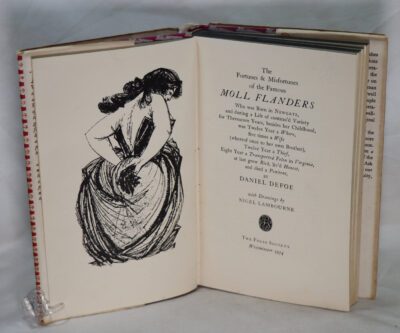The Goebbels Diaries.
By Hugh Trevor-Roper
Printed: 1978
Publisher: Book Club Associates.
| Dimensions | 17 × 24 × 4.5 cm |
|---|---|
| Language |
Language: English
Size (cminches): 17 x 24 x 4.5
Condition: Fine (See explanation of ratings)
Item information
Description
In the original dustsheet. Red cloth binding with gilt title on the spine.
F.B.A. provides an in-depth photographic presentation of this item to stimulate your feeling and touch. More traditional book descriptions are immediately available.
A rare book in collectable condition.
Excellent book, an absolute must read for any serious student of history specialising in The Third Reich. A unique look into the mind of Hitlers most influential assistant without whom The Nazi Party would never have had the political success it had. A most important book about WWII – seen from the inside! Sorry to say, but this criminal writes well – hard to believe how naive these Leaders believed in Victory almost to the very end (May 1945)
Review: Joseph Goebbels was a man without substance, morality, or human feeling for whom radical National Socialism was the be all and end all of life. He “was a man of postures, not ideas or beliefs”. Everything he did was for show including the creation of the myth of the Fuhrer’s infallibility which succeeded in keeping German soldiers loyal long after the war had been effectively lost. Not that Goebbels’s propagandist skills were ineffective. The massive public rallies and Hitler’s speeches were very effective, but Goebbels was always able to distinguish truth from propaganda, combing “a politically calculated fanaticism with an intellectual detachment”. His technique was simple – involving the repetition of crude but effective arguments. He was aware the German people would never have voted for the Nazis had they known what the party intended to do once in power.
Following the outbreak of war Goebbels’s position shrank in importance and he spent some time re-creating the image of Hitler as the reincarnation of Frederick the Great as a means of convincing himself that all was not lost. He gloried in being called a war criminal and spent a lot of time towards the end of the war blaming Churchill, Roosevelt and the Jews for the Allied refusal to abandon their demand for unconditional surrender. He was an efficient administrator for whom activity was a psychological necessity created by his inner emptiness and lack of intellect. He was personally frugal in contrast to the corrupt opulence of Goering whom he despised and blamed for the ineffectiveness of the Luftwaffe. He thought of himself as the one person who could save Germany from what he regarded as the incompetence its generals. He tried to use Stalingrad, as Churchill had used Dunkirk, as a way of raising morale after a defeat but was unable to persuade Hitler to support him.
Goebbels was an advocate of “total war” as opposed to Hitler’s preference for “Blitzkrieg” and was well aware of Himmler’s final solution to the Jewish “problem”. He intrigued with Albert Speer to get rid of Goring but was out manoeuvred by Bormann. In time he began to see Adolf Hitler as the petty bourgeois individual he had tried to have expelled from the Nazi Party twenty years earlier. Yet, ultimately, Goebbels’s inner emptiness meant he needed an object of devotion and was unable to reject the idol he had created. On several occasions he visited Hitler “full of irritation, criticism and hard words” but returned every time full of admiration and optimism.
The most striking feature of the diaries is the lack of understanding of the war situation, hoping that history would repeat itself to snatch victory from defeat. He was in an unreal world of his own making and when the Soviets rejected his bid for a separate peace chose to end his life rather than accept it was the actions of the Nazis which had produced chaos in Germany. In addition, it is clear Goebbels had very good sources of information about the political situation in each of the Allies’ countries. At one time he complained bitterly that Eisenhower was not providing truthful information about his strategic objectives!!
Trevor-Roper concludes his introduction with the observation that left to himself Goebbels’s “only ideal was destruction. His great theatrical gestures were always an incitement to destruction: hymns of hate against the bourgeoisie, the Bolsheviks, the Jews”. He was well aware of the rising criticism against the Nazi leadership – and even of Hitler himself – but he never withdrew his devotion preferring to die in the bunker with his wife, Magda, after she killed their six children. For Goebbels and his wife, the post Nazi world was not worth living for. Their children were not given an opportunity to make up their own minds but sacrificed to Goebbels’s twisted view of reality.
The book includes an excellent chronology of the events of 1945, a useful gazetteer, a valuable name index and a top-class contents page. The diaries cover the period from 27 February to 9 April 1945 and remain a valuable source of information about the mad world in which Hitler and his cronies lived. The irony is, of course, that the man who propagated the myth of the new Aryan Superman was himself under five foot in height and had a club foot. Hitler, the hero he manufactured, suffered from Parkinson’s Disease for the last few years of his life. An irrational observer pretending to be rational, Goebbels was a competent diarist but no Samuel Pepys.
Want to know more about this item?

Share this Page with a friend











